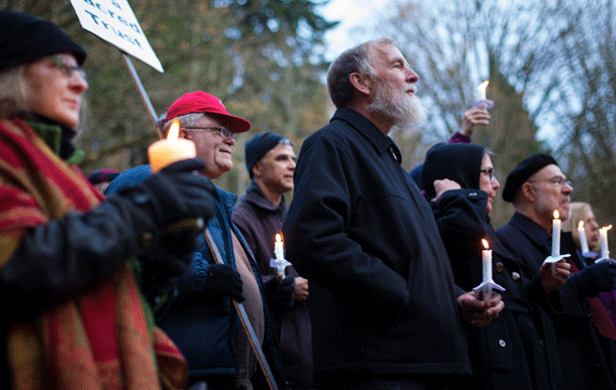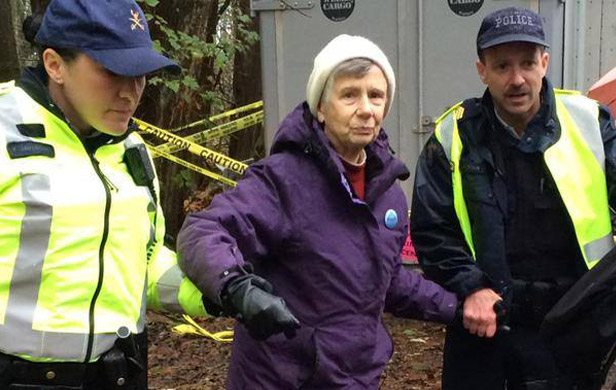
Republished from the ECOreport.
According to the Globe and Mail, Canadian Premiers are about to sign an agreement that would fast track pipeline projects. The 34-page-report describes how to deal with the opposition Energy East, Kinder Morgan, Northern Gateway and Keystone XL faced from environmental groups and First Nations. It suggests that red tape be cut down so decisions can be quicker. If the initial responses from community leaders are an indication, BC says NO to “Canadian Energy Strategy”.
Business as usual not good enough
“I was rather surprised to read the article and I question the urgency and rush. If there is a rush, it is that we diversify our economy instead of doubling down on an industry that is oversupplied globally,” said Green MLA Andrew Weaver.
“A document prepared for a premier’s meeting doesn’t come close to developing a national energy strategy,” says Burnaby Mayor Derek Corrigan.
[quote]If they want social license to move fossil fuel products, they will have to be much more inclusive and listen to the citizens of their provinces and territories. Business as usual just isn’t good enough.[/quote]
Former BC Hydro CEO Marc Eliesen says, “The draft report appears to be outdated and out of step with both current oil market realities, and the strong opposition by most Canadians to building oil pipelines and expanding oil sands extraction without a view to adding value in Canada. Canadians are also clear about their unwillingness to put up with anything short of meaningful limitations on GHG emissions.”
“If what is being reported in the Globe and Mail is accurate, it is extremely short-sighted. We need a genuine shift in our approach to climate change, not some closed-door deal that is going to help the companies and not help the public,” said Bob Peart, Executive Director of Sierra Club BC.
Governing vs. Ruling
Erin Flanagan, of the Pembina Institute, pointed out that because “a very significant number of Canadians” were opposed to both the proposed Kinder Morgan and Northern Gateway pipelines, these projects have been delayed and may never be built.
She added that when constituents raise questions about pipelines or Climate Change, they should be adequately considered.

Bob Peart found the way in which the premiers are trying to cut the voice of the Canadian public out of decision making process disturbing.
“Someone said to me the other day, historically we elected governments to govern and now all they do is rule. There is a difference between ruling and governing. Governments today rule and doesn’t give much room for citizen’s concerns to be put on the table.
“That means you have to yell and scream and build up a public wall of noise. Sometimes they listen to that, but they usually don’t, so you end up having to go to the courts or be like Burnaby Mountain and have people marching,” he said.
Federal election will test pipeline policies
Canada appears to be approaching a crossroads. It is not certain that corporations will continue to exercise the same degree of control as they have in recent years. Peart stressed the need for people to vote in the upcoming election.
“The studies are pretty clear – if voter turn-out is low it favors the right. Generally it is the progressive people who are discouraged and don’t vote,” he added.
“Canadians want and expect to have more say, and I think we will witness that voice during the federal election in October,” said Marc Eliesen.
Premiers could pay political price for pushing pipelines
Flanagan said the “Canadian Energy Strategy” originated with Albertan concerns about access to markets. It is important for premiers negotiating an energy strategy to hear that they “must also consider Canada’s contribution to the fight against Climate Change.” They have to realize “it is not politically advantageous for a premier to sign on to an agreement like this.”


http://www.cbc.ca/news/canada/edmonton/nexen-pipeline-leak-in-alberta-spills-5-million-litres-1.3155907
After the shooting dead of an anti-Site C person in Fort St. John last evening we now know what the governments had in mind when the anti-terrorism legislation was made law.
A frightened population is a docile population as so many dictators have learned. Goodbye Canadian democracy.
You are right Eric, absolutely. The only way we’ll have an inkling of a chance is if are out there as a revolution. That means we as a population will be at war with our own government. This has happened hundreds of times in history and North America has entered those times. That shooting is one of many more to come. Very sad…..